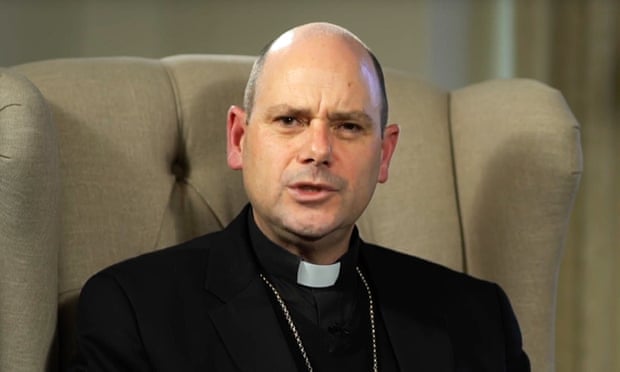Armidale Bishop Directs Catholic Schools to Stop Asking Priests for Working-with-children Checks
By Melissa Davey
A bishop has written to the director of a Catholic Schools Office that oversees 24 schools asking that principals be directed to stop asking priests for their working-with-children checks. The bishop of Armidale, Michael Kennedy, wrote: “It has been brought to my attention that some schools may be requiring that the priests who are ex officio members of the School Advisory Council provide their working-with-children check details.” He wrote that the diocese verified and recorded these checks and that schools should accept that all priests were required by the diocese to have a working-with-children check and therefore did not need to ask the priests for those details. He asked the director of the Catholic Schools Office, Christopher Smyth, to “notify the schools not to ask the priests to provide their working-with-children check and if they have, they are not to register as the priest’s employer for the purposes of verifying the working-with-children check”. Armidale is a city in the northern tablelands of New South Wales. The Catholic Schools Office Diocese of Armidale administers 24 schools, including 19 primary, two central and three secondary schools. The working-with-children check is a requirement for anyone who works or volunteers in child-related sectors, and involves a criminal history record check and a review of reportable workplace misconduct. Schools must register with the Office of the Children’s Guardian and must verify all workers have a valid check, including those working in positions like school cleaners, who may be employed by an external company, or school volunteers. Chris Smyth, the director of schools in the Catholic Diocese of Armidale, said schools had a rigorous and comprehensive child protection policy. “All priests in the Diocese of Armidale who undertake any ministry in Catholic Schools have a current verified working-with-children check,” he said. “The Diocese has provided these to the Catholic Schools Office who then make them available to school principals upon request.” In public schools, school principals and admin staff do not have to request checks from district office and can ask for details of the checks themselves. It follows controversial comments made by Kennedy during Sunday mass about the conviction of Cardinal George Pell for child sexual abuse crimes. He told parishioners: “When you and I look at the cardinal’s life isn’t it reasonable to apply today’s gospel and think ‘surely a good tree doesn’t produce rotten fruit but good fruit?’ “There are many people who, on the information they have gleaned, cannot understand how the jury could have come to a guilty verdict,” he said. “The evidence and testimonies, at least those that have come to public knowledge, seem to leave plenty of room for incredulity or ‘reasonable doubt’ to say the least.” Meanwhile, Kennedy has urged recipients of the Cathedral Parish of Saints Mary and Joseph newsletter to remember Pell in their prayers. It also contained a quote: “A good tree does not bear rotten fruit, nor does a rotten tree bear good fruit.” Pell was convicted following a committal hearing followed by a trial. Jurors deliberated for almost four days after listening to five weeks of evidence. They were unanimous in their guilty verdict. We made a choice… … and we want to tell you about it. We made a choice which means our journalism now reaches record numbers around the world and more than a million people have supported our reporting. We continue to face financial challenges but, unlike many news organisations, we have chosen not to put up a paywall. We want our journalism to remain accessible to all, regardless of where they live or what they can afford. This is The Guardian’s choice: a model for open, independent journalism – free for those who can’t afford it, supported by those who can. We depend on contributions from our readers. Will you support our choice? Readers’ support powers our work, safeguarding our essential editorial independence. This means the responsibility of protecting independent journalism is shared, enabling us all to feel empowered to bring about real change in the world. Your support gives Guardian journalists the time, space and freedom to report with tenacity and rigour, to shed light where others won’t. It emboldens us to challenge authority and question the status quo. And by keeping all of our journalism free and open to all, we can foster inclusivity, diversity, make space for debate, inspire conversation – so more people have access to accurate information with integrity at its heart. Guardian journalism is rooted in facts with a progressive perspective on the world. We are editorially independent, meaning we set our own agenda. Our journalism is free from commercial bias and not influenced by billionaire owners, politicians or shareholders. No one steers our opinion. At a time when there are so few sources of information you can really trust, this is vital as it enables us to give a voice to those less heard, challenge the powerful and hold them to account. Your support means we can keep investigating and exploring the critical issues of our time. Our model allows people to support us in a way that works for them. Every time a reader like you makes a contribution to The Guardian, no matter how big or small, it goes directly into funding our journalism. But we need to build on this support for the years ahead. Support The Guardian from as little as $1 – and it only takes a minute. Thank you.
|
.
Any original material on these pages is copyright © BishopAccountability.org 2004. Reproduce freely with attribution.
